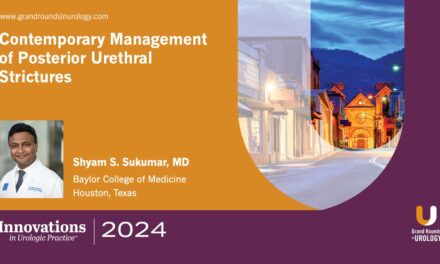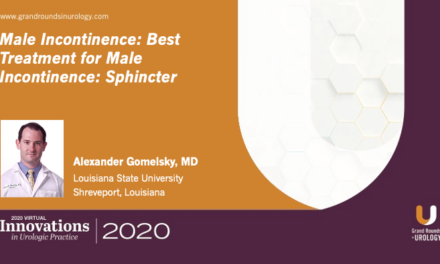Brian S. Christine, MD, presented “Best Treatment for Male Incontinence: Sling” during the Innovations in Urologic Practice 2020 virtual conference in September 2020.
How to cite: Christine, Brian S. “Best Treatment for Male Incontinence: Sling.” September 26th, 2020. Accessed Nov 2025. https://grandroundsinurology.com/best-treatment-for-male-incontinence-sling/
Best Treatment for Male Incontinence: Sling – Summary
In the first part of this urologic debate, Brian S. Christine, MD, Director of Prosthetic Urology and Men’s Sexual Health at Urology Centers of Alabama in Birmingham, argues that the sling is the best treatment for post-prostatectomy stress urinary incontinence in men. He goes over how to select the right candidates for a sling, the pre- and post-operative procedural steps, and the resulting success rate. Dr. Christine notes that slings are best used in patients with mild to moderate stress urinary incontinence as determined by a severity grading system. He considers two options for determining incontinence severity, the pad test and the standing cough test, observing that the latter is preferable given that it is done in-office versus by the patient at home. Dr. Christine then provides a detailed explanation of the surgical steps and technique using an AdVance XP male sling. He concludes that the sling, when used on the ideal candidate with a standing cough test grade of 0, 1, or 2, results in a post-operative success rate of 82-83% of patients who are dry or pad-free. Alexander Gomelsky, MD, FACS, argues in favor of using an artificial urinary sphincter in the second part of the debate here.
About the Innovations in Urologic Practice 2020 virtual conference:
Presented by co-chairs Mohit Khera, MD, MBA, MPH, and Michael Coburn, MD, FACS, the Innovations in Urologic Practice conference provides a detailed review and commentary on multiple genitourinary and urologic diseases. Among the featured oncological topics are bladder cancer and immunotherapies, as well as upper tract cancer management, prostate cancer, including state-of-the-art imaging, focal therapy, and MRI. Experts also discuss new tools and techniques for nephrectomy and treating advanced renal cell carcinoma. In terms of general urological approaches, the conference also includes pelvic reconstruction and trauma, men’s health topics like male infertility and sexual dysfunction, and ways to diagnose and treat infections in the urology patient. Dr. Christine presented this talk virtually at the 2020 conference.
ABOUT THE AUTHOR
Brian S. Christine, MD, attended Emory University School of Medicine in Atlanta, Georgia, and then went on to complete his residency in Urology at the University of Alabama at Birmingham. He practiced general urology for five years, treating urologic cancers, kidney stones, female urology, and male sexual dysfunction. Over a decade ago, Dr. Christine decided to sub-specialize in prosthetic urology and men’s sexual health. At present, his internationally-recognized practice is centered on treating erectile dysfunction, Peyronie’s disease, premature ejaculation, radical prostatectomy-induced urinary incontinence, and low testosterone, as well as providing male genital aesthetic surgery. In addition to his work as a clinician, Dr. Christine is heavily involved in the medical community and is committed to urologic education. He is Fellowship Director and Director of Prosthetic Urology and Men’s Sexual Health at Urology Centers of Alabama. He frequently hosts urologists from around the world and allows them to observe his surgeries. He is a member of the Sexual Medicine Society of North America, the International Society of Sexual Medicine, the European Association of Urology, and the International Continence Society.





